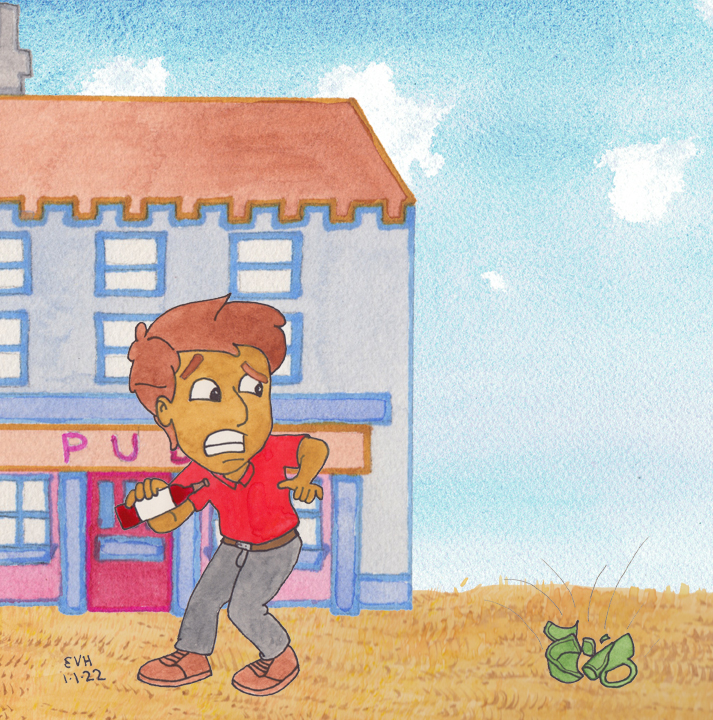
Jataka 291
Bhadra Ghaṭa Jātaka
The Wishing Cup
as told by Eric Van Horn
originally translated by William Henry Denham Rouse, Cambridge University
originally edited by Professor Edward Byles Cowell, Cambridge University
This story is mainly about hungry ghosts, a.k.a., people for whom there is never enough. I once worked with a guy who had a good job. He made good money. He was highly intelligent—at least book-wise. He got a full academic scholarship to college. He was a musician and supplemented his income playing music. And he didn’t even pay rent or have a mortgage. He spent his year doing house sitting, going from one house to the next.
But he also spent money like water. He thought nothing of spending large sums on expensive meals and expensive wine. And by the time he was about 60 years old, he had to declare bankruptcy. It sounds a little like the main character in this story.
“A ne’er-do-well did once…” The Master told this story at Jetavana. It is about a nephew of Anāthapiṇḍika. This nephew had squandered an inheritance of forty crores (400 million) of gold coins. Then he visited his uncle who gave him 1,000 gold coins. And his uncle told him to trade with it.
The man squandered this as well, and then went back to his uncle again. This time he was given 500 gold coins. He squandered this just like the rest. The next time his uncle gave him two coarse garments. When he had worn these out, he once more went to his uncle. Anāthapiṇḍika had him taken by the neck and thrown out. They dragged him outside and threw him down. The fellow was helpless; he fell down by a sidewall and died.
Anāthapiṇḍika went and told the Buddha what had happened to his nephew. The Master said, “How could you expect to satisfy the man whom I long ago failed to satisfy, even when I gave him the Wishing Cup?” And at his request, he told them this story from the past.
Once upon a time, when Brahmadatta was reigning in Benares, the Bodhisatta was born as a rich merchant’s son. After his father’s death, he took his father’s place. He had an only son, and in his house was buried a treasure of 400 million gold coins. The Bodhisatta gave alms and did good deeds until he died. He was reborn as Sakka, king of the gods.
His son proceeded to erect a pavilion across the road. He sat down with many friends around him to drink. He paid 1,000 gold pieces to runners and tumblers, singers and dancers. He passed his time in drinking, gluttony, and debauchery. He wandered about, asking only for song, music, and dancing, devoted to his carousing companions, sunk in sloth. So in a short time he squandered his entire treasure of 400 million gold pieces, all his property, goods, and furniture, and he was so poor and miserable that he had to go about dressed in rags.
Sakka, as he meditated, became aware of how poor he was. Overcome with love for his son, he gave him a Wishing Cup with these words: “Son, take care not to break this cup. As long as you keep it, your wealth will never come to an end. So take good care of it!” and then he returned to heaven.
After that the man did nothing but drink out of it. One day he was drunk, and he threw the cup into the air, catching it as it fell. But one time he dropped it. Down it fell onto the earth and shattered! Then he became poor again. He went about in rags, begging, bowl in hand, until at last he lay down by a wall and died.

Figure: Oops.
When the Master had finished this tale, he continued:
“A ne’er-do-well did once a cup acquire,
A cup that gave hire all his heart’s desire.
And of this cup so long as he took care,
His fortunes were all fair.
“When, proud and drunken, in a careless hour,
He broke the cup that gave him all this power,
Naked, poor fool! in rags and tatters, he
Fell in great misery.
“Not otherwise whoso great fortune owes,
But in the enjoying it no measure knows,
Is scorched quite soon, even as the wretch—poor chump!—
That broke his wishing cup.”
Repeating these stanzas in his perfect wisdom, he identified the birth: “At that time Anāthapiṇḍika’s nephew was the rascal who broke the wishing cup, and I was Sakka.”
